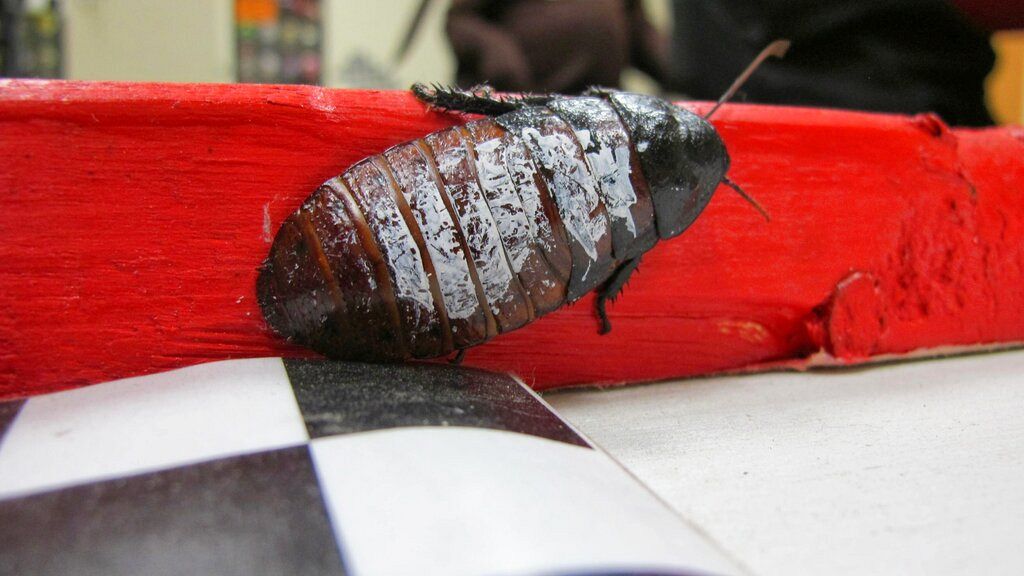
Posted on 02/03/2022 4:46:54 PM PST by nickcarraway
Rédaction Africanews Last updated: 8 hours ago FARMING They may come across as dirty, ugly and nasty creatures that transfer germs from one source to another, but they are worth more than that. According to the World Bank, insects farming could be the answer to the continent's hunger, poverty, and ecological crisis.
Aside the economic benefits, insect farming is said to have some great nutritional value as it tackles undernourishment that affects one in five people in the continent.
Insect consumption has a long history in Africa, but insect farming is much more recent. Africa consumes about 25% of the 2,100 insect species recognized as edible worldwide.
FARMING
Among thousands of edible insect species, approximately 18 have been identified as suitable for farming and upscaled production for animal feed or direct consumption by humans.
One of such insects is cockroaches. The trend in this type of farming is gradually increasing across Africa.
Reports cited online indicate that People have eaten insects and hydroponic crops for hundreds of years. But farming them is new.
In Tanzania, Daniel Rwehura is a pioneer in cockroach breeding. The six-legged insects are gold in the eyes of the young man. He sells each kilo for 5 euros.
According to him this type of farming comes very cheap and can be done anywhere. His main market is poultry and fish farmers but sometimes also get individuals who buy for consumption.
For him, the market is even growing wider as research institutions buy for their research.
According to the world bank, insect farming could produce enough meals to meet up to 14% of the crude protein needed to rear all the pigs, goats, fish and poultry in Africa.
This business seems to be growing quite popular in Tanzania with another farmer Lusius Kawogo claiming to have made a fortune from this. he even gets enquiries from people outside Tanzania seeking to buy from him.
Both farmers say cockroaches require no food other than scraps at your local waste disposal facility making it easy for farming.
Estimates show that the market for insects as food and animal feed will be worth up to US$8 billion by 2030, a 24% compound annual growth rate (CAGR) over the decade. • Africans are willing to farm insects.
A study of Ugandan fish farmers shows that over 90% were willing to use insects for feed, but fewer than half ever had.
In Africa, insect farming institutions and regulatory frameworks are still in their early stages.

Oliver Wendell Douglas didn’t need to move to Hooterville to own a farm. He could have just harvested roaches in NYC.
“Hey! Whassa big deal? Ya eat sea-bugs, don’cha?”
Oh...never mind...those are Democrats.


"Cockroaches."

Yup, you know it!
Just what the earth needs, more disease carrying vermin. Me thinks Mr Bill Gates gets a hard on for pestulent bugs.
No, but I've never watched IAWL all the way through. Which part is it from?
There are insects I would be willing to eat. Cockroaches are not one of those insects.
I hear Keith Richards is buying stock into infinity.
Well, that’s great. Africa has its food solution right there.
I’ll stick with our normal food solutions.
But is the feeling reciprocal?
Once upon a time, I would have said that Kathrine Ross was cuter than Donna Reid. Now I think the opposite. Donna Reid looks irresistible to me now, and Kathrine Ross looks like nothing but trouble.
Donna Reed, circa ‘It’s a Wonderful Life,’ had it going on... in a big way.
Being invited over for afternoon tea and roaches is out of the question, then?
Makes a lot of sense for animal feeds, insects have nearly twice the protein per gram of mass vs vertebrates. For monogastric animals such as chickens, pigs, fish and other small vertebrates which are not four stomach ungulates protein is the limiting value in feeds carbohydrates and polylipids are cheap and plentiful. Complete protein which insects create cannot be supplied by one species pf plant alone be it soybean ,chickpea, mung bean none have all 9 essential amino acids that monogastrics cannot.synthesis for themselves unlike ungulates. Given that insects can eat organic wastes including fecal matter and turn it into high quality complete protein it is perfectly logical feed it to animals that could care less if that protein is an insect. Fish are particularly deficient in protein synthesis those that are predatory need 100% of a diet that is half protein from prey fish substituting insect protein removes the need for fish meal to raise farmed fish which have the highest feed to meat conversion ratio of any vertobrate the next closest is avians. Pigs are way down the list. Of course with a source of nitrogen be it urea or ammonia ungulates like goats, cattle or sheep use the bacteria in their stomachs to ferment microbial protein from cellulose. Cows are not grass feed they are fermentation factories who actually live off the.acetic acid and bacterial protein from the last three of their stomachs the grass is food for the microbes in those last three chambers a cow will die if you use too much antibiotics on it and kill its symbiosis system. People can also eat insects if they choose they are much lower in fat and cholesterol vs any other source of terrestrial protein but the yuck factor stops many. Personally my world.travels have taken me to Africa , Asia and latin America all cultures that eat a large variety of insect protein. Grasshoppers are good so are locusts, chocolate covered crickets as well. Stir fries locusts in Africa in dry chili powder tastes identical to the same dish made with dried ocean shrimp I had in central Mexico. Its’m all in peoples heads, we eat lobster and crabs if people knew what those creatures eat every day and how they live on the ocean floors they would be much happier eating vegan crickets grown on edible fruit scraps. Just saying
There is a difference in eating bugs all the time and eating them once in awhile, either as a treat or as famine food.
When I worked in Africa, people would collect “flying ants” when they swarmed as a treat. Here in the Philippines, they eat crickets but it is not common any more.
Western pioneers ate grasshoppers and rattlesnakes but I don’t think their descendents would prefer to eat them instead of steak
Disclaimer: Opinions posted on Free Republic are those of the individual posters and do not necessarily represent the opinion of Free Republic or its management. All materials posted herein are protected by copyright law and the exemption for fair use of copyrighted works.